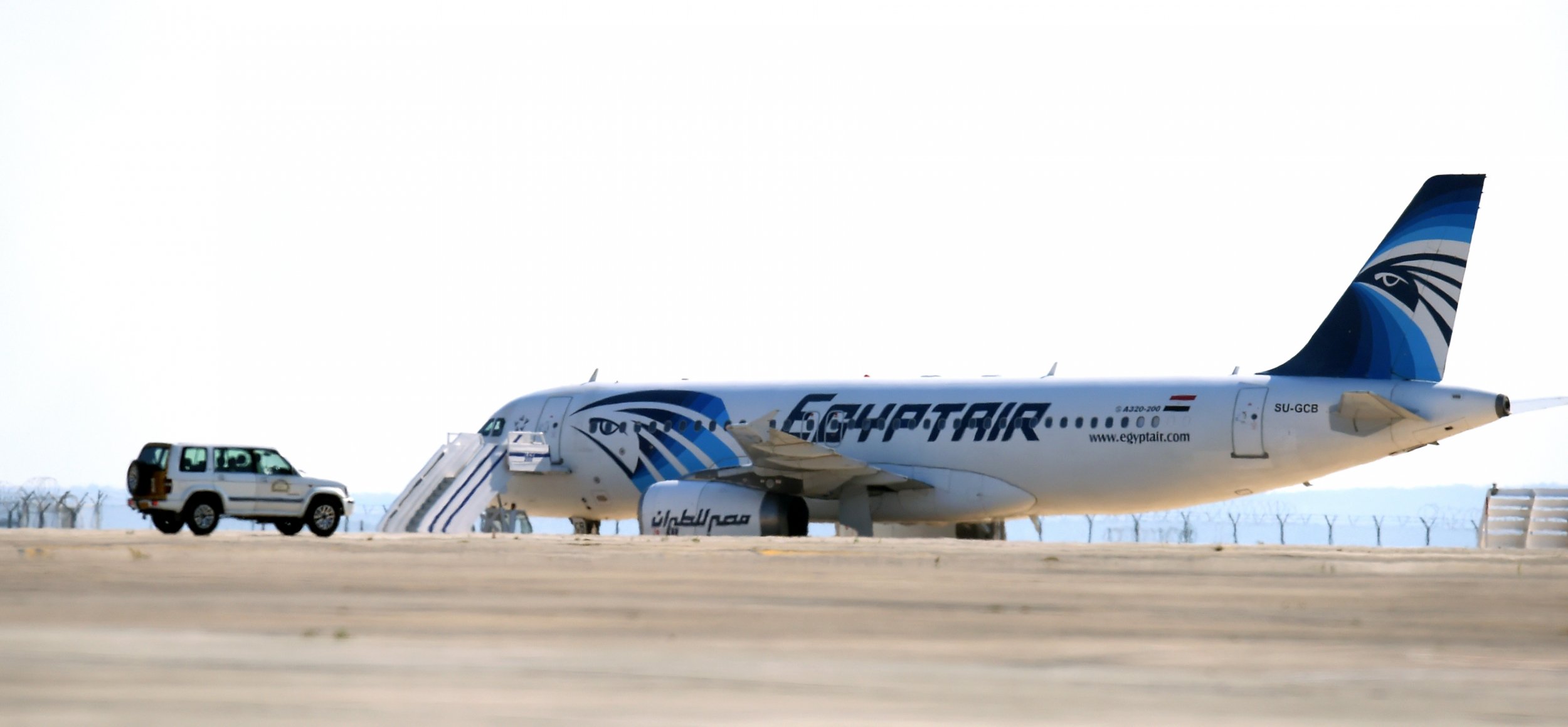
Updated |
- Plane "crashed" over the Mediterranean sea, says Francois Hollande
- Airbus A320 was traveling from Paris to Cairo
- Aircraft was carrying 56 passengers, 10 cabin crew
- Paris prosecutors open investigation into crash
- Egyptian plane finds large, plastic floating objects in search for debris
- The cause of the crash remains unconfirmed
- Head of Russia's FSB says most likely caused by an extremist "attack"
An EgyptAir aircraft traveling from Charles de Gaulle airport in Paris to Cairo "crashed" over the Mediterranean sea with 66 people on board on Thursday, French President Francois Hollande has confirmed.
"We must ensure that we know everything on the causes of what happened. No hypothesis is ruled out or favoured," he said in a televised address.
EgyptAir Flight MS804 went missing at 2:45 am local time with 56 passengers and 10 cabin crew on board, at an altitude of 37,000 feet, the airline said. The Airbus A320 disappeared 10 miles (16 kilometers) after entering Egyptian airspace, some 280 kilometers north of the Egyptian coast. Egyptian military aircraft are searching for the aircraft and Greece has joined the search and rescue operation, dispatching two aircraft.
EgyptAir said the cause of the disappearance remained unclear as the search efforts continued but the Egyptian Civil Aviation Minister Sherif Fathi said that the indications suggested an extremist attack rather than a technical failure.
"If you thoroughly analyze the situation, the possibility of having a different action or a terror attack, is higher than the possibility of having a technical failure."
An Egyptian search plane discovered two orange items believed to be from the missing plane some 230 miles southeast of the Greek island of Crete, a Greek military official told the Associated Press.
"The plane carried out a 90-degree turn to the left and a 360-degree turn to the right, falling from 37,000 to 15,000 feet and the signal was lost at around 10,000 feet," Panos Kammenos told a news conference.
"It appears the plane is lost. There are no clear results (from the search) so far," he said.
Both the Egyptian Prime Minister Sherif Ismail and French Prime Minister Manuel Valls said that no theory could be ruled out in the investigation into the plane's disappearance. The Paris prosecutor's office has opened an investigation into the crash.
Alexander Bortnikov, the head of Russia's top security agency, the Federal Security Service, said that the plane had "in all likelihood" been brought down by an extremist attack and called for joint European action to hunt those responsible for what he called a "monstrous attack."
Ismail said that there was no "distress call" from the plane but a "signal." EgyptAir confirmed that a "distress signal" had been received from the flight before its disappearance but it is unclear if this was sent to aviation authorities or the Egyptian military. The Egyptian military spokesman Brig. Gen. Mohammed Samir said in a Facebook statement that the army did not receive a distress call.
The head of Greece's civil aviation department, Kostas Litzerakis, said that the plane disappeared from radars two minutes after leaving Greek airspace, and reported "no problems."
The passengers on the flight included 30 Egyptians, 15 French, two Iraqis, one Briton, one Belgian, one Canadian, one Kuwaiti, one Saudi, one Sudanese, one Chadian, one Portuguese and one Algerian, EgyptAir confirmed. It was also carrying 10 cabin crew.
An EgyptAir pilot, speaking on condition of anonymity as he was not authorized to speak to the media, says he has to "sadly agree" with Egyptian aviation officials that the flight has crashed but he hopes "they find them alive in the water."
"No, according to what I know," he says when asked if an aircraft can disappear from the radar but still be safe. "But I wish I'm wrong. There is not enough fuel to make it fly that long."
He adds that the "Airbus is a good plane" when asked about its safety record but said it was unlikely that an extremist act was the cause of its disappearance.
The flight was on its fifth flight of the day and EgyptAir said that the captain of the flight had 6,275 hours of flying experience, with 2,101 on the A320 model.
French President Francois Hollande called his Egyptian counterpart Abdel Fattah el-Sisi and both "agreed to cooperate closely" to find out what happened to the aircraft. Valls said that French authorities were "ready" to join the search operation to find the missing aircraft.
The disappearance of the flight comes just weeks after a passenger hijacked an EgyptAir flight, and the same model of aircraft, as it flew to Cairo, forcing it to divert to Cyprus.
This is a developing story and will be updated as more information becomes available
Uncommon Knowledge
Newsweek is committed to challenging conventional wisdom and finding connections in the search for common ground.
Newsweek is committed to challenging conventional wisdom and finding connections in the search for common ground.
About the writer
Jack is International Security and Terrorism Correspondent for Newsweek.
Email: j.moore@newsweek.com
Encrypted email: jfxm@protonmail.com
Available on Whatsapp, Signal, Wickr, Telegram, Viber.
Twitter: @JFXM
Instagram: Read more
To read how Newsweek uses AI as a newsroom tool, Click here.








